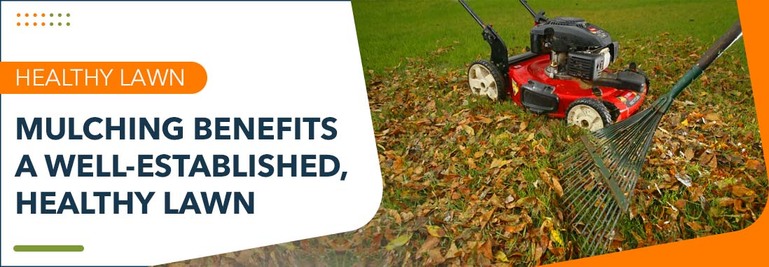Survey: Should I Rake or Mulch My Leaves? 275 Homeowners Share Their Thoughts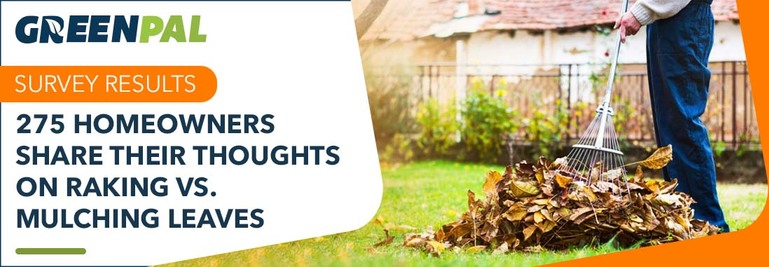
Every time fall rolls around, one question comes up time and again: should I rake or mulch my leaves? Well, fall is knocking at the door. So, we thought we'd ask homeowners their take. Mulch or rake?
We polled 275 homeowners on the topic. Check out what they said:
Key Results
# 164 voters prefer mulching |
# 111 survey-takers prefer raking |
# 82 mulchers named ease and speed as the main reason for choosing mulching |
# Preventing pests and lawn disease (76 votes) was the main reason listed by those who chose raking over mulching |


Should I Rake or Mulch My Leaves?
If you own a home with many trees, you've probably been forced to choose between raking and mulching your leaves. Let's discuss both processes and find out more about their benefits.
What is Mulching?
Mulching is chopping leaves into pieces and spreading them over your lawn. Many homeowners in our survey do this by running a lawn mower (usually with a blade meant for mulching) over the leaves and allowing them to decompose in garden beds and across the lawn.
As the leaves decompose, they return nutrients to the soil – nitrogen, phosphorus, and potassium, the same products that stimulate healthy grass growth – reducing the need for chemical fertilizers. Mulched leaves may also help prevent weeds from taking root.
Mulching adds organic matter to the soil, which helps to improve its structure and water-retention properties.
Ultimately, this could mean stronger root systems and a thicker, greener lawn.
It prevents the leaves from collecting in a pile and killing the lawn underneath in the spring.
For many respondents in our survey, mulching is also a convenient way to deal with the leaves. No more bagging? Many say, sign me up! The leaves just get chopped up and left in the yard, where they'll decompose quickly without any effort on your part. So, leaf cleanup is faster and easier.
Mulching reduces waste sent to landfills; rather than putting leaves in bags for pickup, you recycle them directly into the lawn.
RELATED: Best Leaf Mulchers of 2024

Potential Drawbacks of Mulching
One worry is that people will let too many leaves accumulate or mulch them too heavily. This issue could create a thick mat that blocks sunlight and prevents air circulation, encouraging turf disease.
When wet, mulching heavy layers of leaves will trap water on the lawn's surface, possibly promoting fungal diseases such as snow mold, but finely mulched leaves reduce this risk.
RELATED: The Helpful Guide You Need to Combat Lawn Diseases
What is Raking?
Raking includes manually collecting the fallen leaves off the lawn and putting them into plastic bags to be taken to the curb for collection or, in some cases, using them for compost or mulch in garden beds. For generations of homeowners, raking has been an annual autumn ritual.
Raking thins out a layer of leaves that would otherwise suffocate your grass. Picking up large piles of leaves means your lawn can continue breathing and soaking up whatever sunlight, water, and nutrients it can.
To some survey-takers (35 votes), a raked lawn looks neater and more well-kept. There's an aesthetic element of pride in seeing a lawn free from the debris of fallen leaves.
Raking the leaves and disposing of them properly will reduce tick-friendly habitats and cut down on them spreading Lyme disease. It will also help to prevent the fungal diseases that grow in decaying, damp leaf litter.
Potential Drawbacks of Raking

Raking is hard work. It's especially tough for those with large yards. You're left with leaf piles to bag or compost when you rake.
This can get expensive. Depending on where you live, you may pay a pretty penny to dispose of your leaves or hire a company. Raking also takes away vital nutrients mulched leaves provide.
Factors to Consider When Choosing Between Raking and Mulching
Having weighed the pros and cons of raking and mulching, which is right for you?
Here are some considerations:
Lawn Size and Type
Mulching can be more efficient than raking if your leaves don't accumulate greatly. With a few passes of your mower, they'll be ground up. If your lawn is large, a combination of raking and mulching is likely to be your best bet, especially if the number of fallen leaves is too high to mulch effectively.
Leaf Fall Volume and Type
Many survey-takers with light to moderate leaf accumulation said mulching is their favorite way to manage their leaves. However, several homeowners with heavy leaf fall felt raking was the best way to prevent creating a damp environment on their lawns.
Sometimes, leaves may be too wet, thick, or waxy to be broken down well by mulching. One homeowner noted:
"We have a bunch of pine trees. Raking is my only option — mulching pine needles just doesn't work out well."
Lawn Condition
If your lawn is healthy and well-established, mulching is more beneficial. Leaf mulch will build up the health of your lawn over time. Skip mulching, though, if your lawn is thin or patchy. Rake instead. The grass may be struggling to grow, so giving it the sunlight and space it needs is best.
Climate and Moisture Levels
Mulching is a good choice in dry, warm locations; the fungal growth problems from covering the soil are less of an issue.
In areas with heavy rainfall or high humidity, mulching may cause more harm than good. Wet leaves can mat down the lawn, creating a lush habitat for fungal diseases, so raking may be the only safe option.
Why Can't Leaves Stay on My Lawn?
Leaves fall. They line forest floors. Makes sense to let them be, right? Leaving leaves on your lawn seems natural, but it will ultimately end up causing several issues. Over time, these issues can harm your grass by lowering its health and appearance.
When leaves build up, they can create a thick layer that will smother your grass. If you have ever seen a compost pile, you know that it is dark and can become wet. Grass needs sunlight, water, and air. If you have a thick layer of leaves on your lawn, you will block your grass from the resources it needs to survive. Eventually, your grass will begin to thin and possibly even die, leaving bare or patchy areas that are much harder to fix.
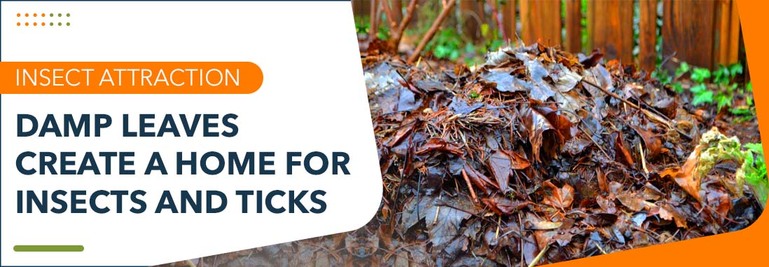
Worse, the longer your leaves remain on your lawn, the greater the risk that you'll see a fungal disease problem. Bottom-dwelling fungi thrive when grass blades are trapped under a tight blanket of leaves, where moisture can't readily evaporate. Leaves create opportunities for pests.
Insects and pests love damp, decomposing leaves. Decaying leaves help create a safe space for insects, slugs, ticks, rodents, and insectivores like moles.
RELATED: Moles vs. Voles: Revealing the Truth About Two Lawn Invaders
Expert Tips for Effective Mulching and Raking
Whether you decide to rake or mulch, it's important to have a plan to keep your lawn healthy. Although your approach may vary depending on whether you choose to rake or mulch, there are some general tips to keep your leaves tidy.
1. Stay proactive: When leaves start to fall, you'll want to be ready — especially if you plan to mulch your leaves as you mow. Don't wait until leaves have piled up to begin the process.
2. Monitor the weather: Whether you're mulching or raking, you'll want to do it when the leaves are dry. Don't wait until after a rainstorm hits to get out there.
3. Use the right equipment: A normal mower blade will shred up leaves, but a mulching mower blade is designed to chop them finer, helping them decompose more quickly. Choose a rake with a wide head, strong tines, a cushioned grip, and plenty of length.
4. Divide and conquer large yards: If you have a large yard, rake a bit at a time and avoid doing everything at once. Segment your yard as best as possible and stick to the routine and schedule.
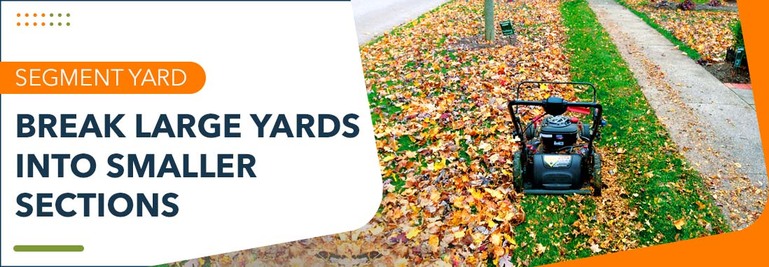
Quick Summary
Criteria | Mulching | Raking |
Preference | 164 homeowners prefer mulching | 111 homeowners prefer raking |
Primary Reason | 82 voters chose mulching for ease and speed | 76 voters chose raking to prevent pests and lawn diseases |
Benefits | Adds nutrients to soil, saves time, improves soil structure, reduces waste | Thins leaf layer, prevents fungal diseases and pests, gives a clean, neat look to the lawn |
Potential Drawbacks | Over-mulching can block sunlight, encourage turf disease; wet leaves may trap moisture | Labor-intensive, costly if hiring disposal services, removes valuable nutrients |
Best For | Lawns with light to moderate leaf fall; healthy, well-established lawns | Lawns with heavy leaf fall or wet conditions; thin or patchy lawns |
Ideal Conditions | Dry climates with less risk of fungal issues | Wet or humid climates where excess moisture could harm the lawn |
Is raking or mulching a better way to go? Both methods have advantages. Mulching provides better nutrition for your lawn, saves time, and is more environmentally friendly. A raked lawn often appears more well-kept and is less likely to get smothered.
Many experts suggest that mulching is best in many cases. One hundred sixty-four survey respondents felt the same. Why? Mulching keeps leaves from smothering your lawn, but it also adds valuable nutrients back into your lawn.
Those in our survey who decided to rake instead were also primarily concerned about their yard's health, but 35 voters who rake also preferred the tidiness of raking. So, should you rake or mulch?
Mulching is best if you have the right equipment and yard and live where the leaves won't get too wet. At the end of the day, though, getting the leaves off the lawn is most important, and raking does the job well, too. 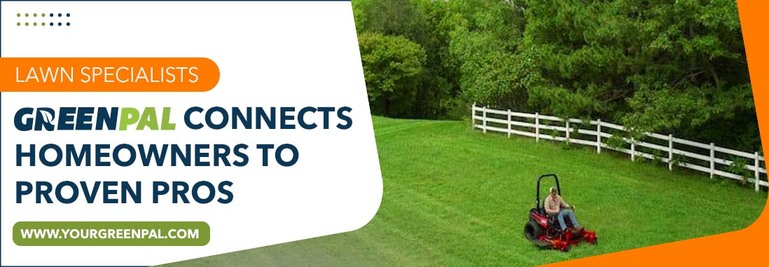



 Share
Share




